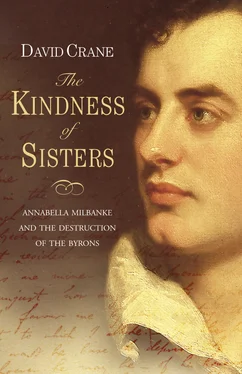He knew himself detested, but he knew
The hearts that loath’d him, crouch’d and dreaded too.
Lone, wild, and strange, he stood alike exempt
From all affection and from all contempt:
His name could sadden, and his acts surprise;
But they that fear’d him dared not to despise:
Man spurns the worm, but pauses ere he wake
The slumbering venom of the folded snake:
The first may turn, but not avenge the blow;
The last expires, but leaves no living foe;
Fast to the doom’d offender’s form it clings,
And he may crush – not conquer – still it stings! 70
‘I have just finished the Corsair – am in the greatest admiration’, Annabella Milbanke, wilting forgotten in the wings since her rejection of Byron’s proposal, wrote to Lady Melbourne,
In knowledge of the human heart & its most secret workings surely he may without exaggeration be compared to Shakespeare. He gives such wonderful life & individuality to character that from that cause, as well as from unjust prepossessions of his own disposition, the idea that he represents himself in his heroes may be partly accounted for. It is difficult to believe that he could have known these beings so thoroughly but from introspection … I am afraid the compliment to his poetry will not repay him for the injury to his character. 71
For a brief period in the autumn of 1813 – probably to placate Lady Melbourne – Byron did his best to draw back from the edge with his pursuit of the young, newly married Lady Frances Webster, but by the end of the year Augusta was pregnant with a child which the dates suggested might well be his. In the middle of the following January, with a crisis mounting, brother and sister drove north to Newstead, ‘through more snows than ever opposed the Emperor’s retreat.’ Once arrived, there was no possibility of leaving. The roads beyond the Abbey were impassable, but their coals were excellent, he told his publisher, John Murray, the fireplaces large, the cellar full, his head empty, his only desire ‘to shut my doors & let my beard grow.’ 72
For the moment, defiance and refuge were in perfect equilibrium. ‘Never was such weather’, Byron wrote contentedly after ten days, ‘one would imagine Heaven wanted to raise a Powder-tax & had sent the snow to lay it on.’ 73 Never had his ancestral home seemed so all-sufficient as with Augusta. ‘And what unto them is the world beside,’ Byron later demanded in Parisina, his drama of incest and family doom that echoes the mood of these weeks,
With all its change of time and tide
Its living things, its earth and sky,
Are nothing to their mind and eye.
And heedless as the dead are they
Of aught around, above, beneath;
As if all else had pass’d away
They only for each other breathe …
Of guilt, of peril, do they deem
In that tumultuous dream? 74
There is something, in fact, of the magic of Pasternak’s Dr Zhivago about Byron’s and Augusta’s illicit exile at Newstead, isolated from criticism and responsibilities by the impenetrable winter landscape, as safe among the ruins of the abbey as Yuri and Lara in the frozen wastes of Varykino. At the edge of Newstead’s cloistered world lurked the wolves, but like Zhivago watching their shadows in the half-light of dusk, Byron could pretend for the moment that they were merely dogs. To be alive, and to live in the present, was enough. All his restless search after sensation was sunk in ‘sluggish’ content. Even the desire or need to write – for Byron the ‘lava of the imagination’ 75 – was gone. Happy, he had neither need nor urge to create. He felt, he told Murray in a revealing metaphor for his poetic life, as he did when recovering from fever in Patras – ‘weak but in health and only afraid of a relapse.’ ‘I shall keep this resolution’, he wrote of his determination to give up scribbling, ‘for since I left London – though shut up – snow bound – thaw bound – & tempted with all kinds of paper – the dirtiest of ink – and the bluntest of pens – I have not even been haunted by a wish to put them to their combined uses.’ 76
The wolves, though, were not dogs, and with the Tory press in full voice following the publication of his poetic squib against the Prince of Wales, Caroline Lamb still primed for trouble and his friends increasingly nervous, Byron was never going to be allowed to forget it. Characteristically, just as the previous year Caroline’s antics had frightened him back from the abyss, his moods now swung between defiance and compromise, between talk of the exile he had been threatening for almost a year and a marriage – any marriage – that might yet be his ‘salvation’ from the feelings that he confessed to Lady Melbourne ‘are a mixture of good and diabolical’ 77 .
After his first impetuous talk of exile, Augusta too was beginning to look on the idea as the only way of averting catastrophe. There is little doubt that she would have gone abroad with him the previous summer if he had pressed her, but in the nature of things she had more to lose than he did and for a mother as indulgently devoted as Augusta, the thought of abandoning any of her children – Georgiana, her eldest, had been born in the first week of November 1808, Augusta Charlotte, a little over two years later and a son, George, in June the next year – could never have been a bearable option.
George was still only a baby when Byron first proposed exile to Augusta, however, and it was probably her two daughters who most exercised her concern. From an early age Augusta Charlotte had begun to exhibit the symptoms of autism that would eventually lead her to an asylum in Kensal Green, and yet in her different way the oldest, ‘Georgey’ – traditionally Byron’s favourite – was as much of a worry as her sister, constantly ill and as cripplingly and elusively shy as Augusta herself had been as a child.
And even with Augusta’s easy belief in the workings of a benevolent providence – virtually the only legacy from her pious Holderness grandmother – she must have felt that she had used up not just her small stock of courage but her luck when the birth of a third daughter in April passed without any gossip. It is impossible to tell from the few elliptical comments in Byron’s letters how anxious they had been in advance, but whatever his thoughts on the child he was certainly concerned enough for Augusta to journey up from London to the Leighs’ home outside Newmarket in the days before her confinement.
For all the space and time that has been expended on the subject, the only thing that can be said with any certainty of the paternity of Elizabeth Medora Leigh, is that it cannot be known. It would seem likely that Byron and Augusta both initially believed that she was his child, and yet there is not a single scrap of evidence – not a remark or silence – that cannot be equally well interpreted to support either side of the argument. ‘Oh! but it is worth while’, Byron reported to Lady Melbourne – in the one notorious, throw-off paragraph on which a whole speculative industry has been raised,
I can’t tell you why – and it is not an ‘ Ape ’ [an apparent reference to medieval incest superstitions] and if it is – that must be my fault – however I will positively reform – you must however allow – that it is utterly impossible I can ever be half as well liked elsewhere – and I have been all my life trying to make someone love me – & never got the sort I preferred before. But positively she and I will grow good – and all that – & so we are now and shall be these three weeks & more too. 78
For all Byron’s resolutions, however, the choice of the name Medora – the heroine of his Corsair – smacks of the kind of brinkmanship that threatened disaster at any moment. It has been argued, with some plausibility, that she was in fact called after the Oaks winning filly of 1813, but even if that is true Augusta – for all her ‘goosiness’ – was astute enough to know that in anything to do with Byron it was the perception rather than the reality of things that mattered.
Читать дальше










